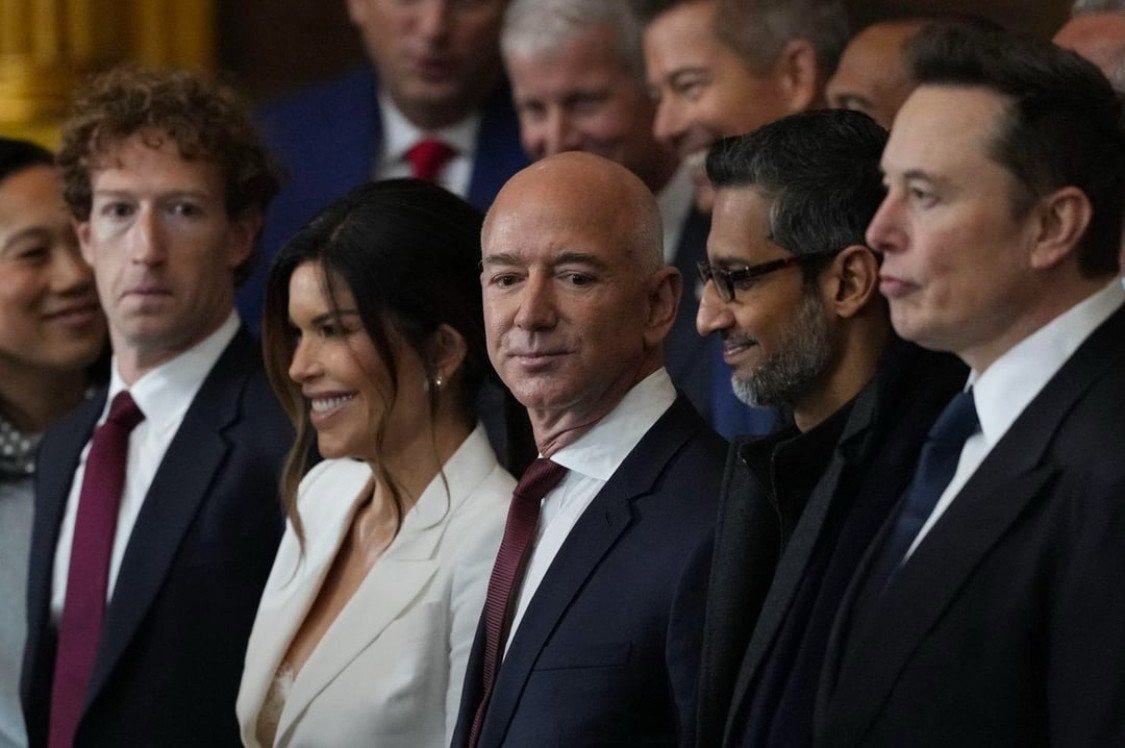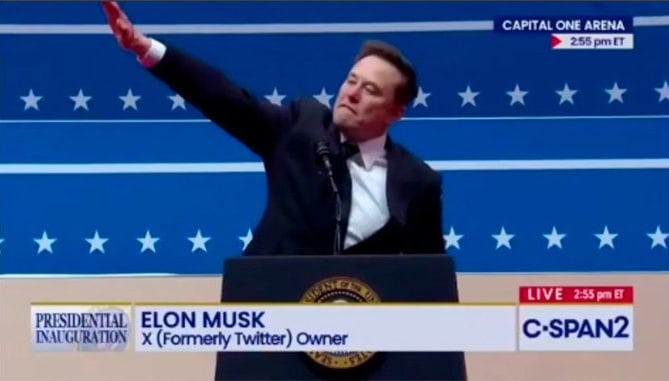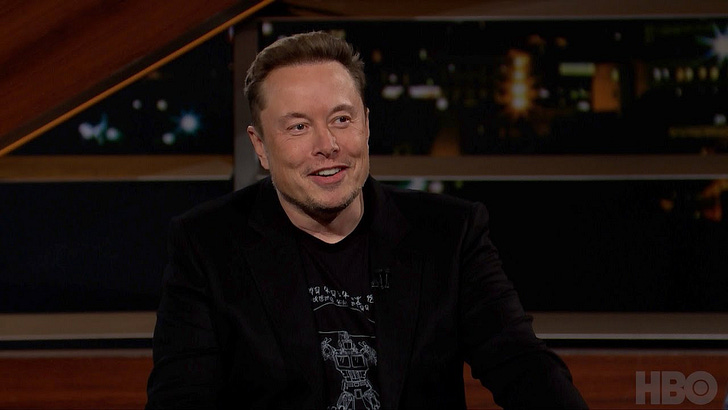California, über alles
In 1995, two Brits predicted all this would happen. It's not what you'd call good.
Welcome to the weekend edition of The Experiment, your official hopepunk newsletter. If you’d like to support my work, become a paid subscriber or check out the options below. But even if you don’t, this bugga free. Thanks for reading!
To paraphrase Norm McDonald’s joke about Adolf Hitler, you know, with Trump, the more I learn about that guy, the more I don’t care for him. Decades of progress was undone in a week as the President, no longer surrounded by disabling caretakers and furtive patriots, has launched us into an as-yet-undefined era that feels like the manifestations of hysterical hypotheticals. So many things happened that it became difficult to see what is actually happening.
But that’s only if you try to count the cars while standing in traffic. It’s hard enough not to get run over. Learning to see clearly is something we’ve discussed often here, and sometimes you need to back up to see what’s right in front of you.
***
In 1995, I had an AOL account that I accessed with a 2400 bps modem that I could only use if no one else at home was using the phone. This was a year before I first heard the word “yahoo” in a non-cowboy context. A year after that, I heard the profound insight that some day all businesses would have a website. You might even be able to buy something on it or make appointments. In 1997, this sounded unimaginably futuristic.
But back in 1995, everybody was already talking about the dot-com boom. I looked right at the stocks skyrocketing and mistook it for Tulip mania. I did not see what was really happening. Richard Barbrook and Andy Cameron did, however. They were media theorists from the University of Westminster who looked past the hysteria about money and saw the “long-predicted convergence of the media, computing and telecommunications into hypermedia.” They extrapolated how this would change the fundamental experience of being alive and got it exactly right. In 1995, they looked at an Internet where it took around a minute and a half to download a webpage, snapped their fingers and said, Bang, being human’s different now.1
The Californian Ideology promiscuously combines the free-wheeling spirit of the hippies and the entrepreneurial zeal of the yuppies.
That insight should be enough for any media theorist to hang his or her hat on, but this is only the first half of the first paragraph of the paper they wrote. First published in Mute magazine, the article soon went what we’d now call viral on an early Internet mailing list. Salon called their paper “one of the most penetrating critiques of neo-conservative digital hypesterism yet published.” Wired’s publisher said the piece displayed “profound ignorance of economics.” If you could tell your dongle from your dial-up, you probably had a strong opinion about Barbrook and Cameron’s article.
Their article, The California Ideology, identified a new belief system that combined the New Left and the New Right.
This new faith has emerged from a bizarre fusion of the cultural bohemianism of San Francisco with the hi-tech industries of Silicon Valley. Promoted in magazines, books, TV programmes, websites, newsgroups and Net conferences, the Californian Ideology promiscuously combines the free-wheeling spirit of the hippies and the entrepreneurial zeal of the yuppies. This amalgamation of opposites has been achieved through a profound faith in the emancipatory potential of the new information technologies. In the digital utopia, everybody will be both hip and rich. Not surprisingly, this optimistic vision of the future has been enthusiastically embraced by computer nerds, slacker students, innovative capitalists, social activists, trendy academics, futurist bureaucrats and opportunistic politicians across the USA. (emphasis added)
It seems counterintuitive, but hippies and yuppies2 fit together like chocolate and peanut butter. Both didn’t want the government telling them what to do, both didn’t want to join legacy organizations such as the military, church, or corporations, and both—this is key—believed they could create utopia.
Both sides of the California Ideology, argued Barbrook and Cameron, believed they were creating the “next stage of capitalism.” And while there is an obvious conflict between the New Left’s anti-corporate, counter-culture vision of a “virtual community” and the New Right’s libertarian boner for disrupting existing industries and replacing them with electronic marketplaces, Barbrook and Cameron wrote that “the Californian Ideology happily answers this conundrum by believing in both visions at the same time - and by not criticising either of them.”
This is less of an intellectual inconsistency and more of a wolf in sheep’s clothing situation in which the wolf is convinced he’s made of mutton.
This explains why new technology is always proposed in messianic terms and why the merest suggestion of regulation or criticism is condemned as heresy. The California Ideology offers a Star Trek utopia populated by Isaac Asimov characters. An example that comes to mind is Elon Musk, who talks in grandiose terms about saving humanity while becoming an example of humanity not worth saving. This is less of an intellectual inconsistency and more of a wolf in sheep’s clothing situation in which the wolf is convinced he’s made of mutton.
This also explains, at least to me, why we’re always surprised, or at least I am, when tech bros turn out to be rapacious moneyhumpers. In the ‘90s, I drank the Kool-Aid that the Internet would connect humanity—which, admittedly, it did—and also unite humanity. I didn’t expect the nazis. Or for the Savior of Humanity to pop off a nazi salute, twice, at Donald Trump’s second inaugural. It’s true. No one expects the Spanish Inquisition, especially when it tells you in full sincerity that it was going to be a pretty chill hang.
A word that Barbrook and Cameron used to describe the California Ideology is neoliberal, a word that’s often used as a cudgel by leftists against liberals. I’m not here to argue that point—fight amongst yourselves, that’s why we have a comments section, lovies—but I do want to ask whether we’ve been misreading the word itself.
In his recent essay in The Atlantic, Jonathan Chait suggests that the term has become, if not meaningless, then meaning less.
The recent versions of the two parties did narrowly agree on a handful of policies, including the virtues of globalization, but starting with the Reagan era, they had grown more divided, not more united, on economics. Barack Obama had bailed out the auto industry, regulated Wall Street, and redistributed hundreds of billions of dollars from the rich to the poor. Even Bill Clinton had engaged in bitter showdowns over taxes and spending. The notion that Clinton and Newt Gingrich, or Obama and Paul Ryan, were partners with a shared ideology that could be usefully defined by a single term ignores almost everything that happened during these years. It is a measure of the incoherence of “neoliberalism” that the term can be, and has been, applied as an epithet to almost anything: Paul Krugman, Ta-Nehisi Coates, public-employee unions, Beatles fandom.
But what if the word’s lack of meaning is its point? What if the utility of the word isn’t undercut by its lack of a genuine definition but is proven by it? The California Ideology has become essentially the governing ethos of our country over the last few decades, and now we have a national headspace so in conflict with itself that we’re no longer sure what we believe in. Neoliberalism couldn’t be a better word for these times if Jerry Seinfeld had invented it for his show about nothing.
***
So what are we seeing when the most powerful tech CEOs in the world (that is, the richest and most powerful people in the history of the world) sit in the front row at Trump’s inauguration? Is it mere supplication and subjugation to the former real estate developer and game-show host? From Trump’s perspective, it could be. To him, they might look like expensive dolls he’s collected. But we’re trying to see what is actually going on, and Trump is an unreliable narrator of reality.

Don’t think of them as supplicants. Think of them as the owner’s box. Trump ran as an outsider, but he’s so thirsty for the approval of the oligarchs that he’s paying any price for their approval. He flipped on Tik-Tok even though it meant he couldn’t be racist against China anymore. And after promising to return astronauts to the moon, he is now redirecting our ambitions in space to Mars, which happens to align with Musk’s own, super-creepy ambitions.
And besides Musk’s SpaceX becoming essentially our space program, Trump also gave Musk a White House email address and control of the U.S. Digital Service, part of the Executive Office of the President, where he now has access to privileged government data about all of us.
In his new role, Musk appears to have vast access to the inner workings of government that far exceeds the plan as initially conceived. The DOGE leader, also the chief executive of one company that has won billions of dollars in federal contracts and others that have faced significant federal scrutiny, will be able to deploy a team of handpicked software engineers to every government agency, where under Trump’s executive order they will be granted “full and prompt access to all unclassified agency records, software systems, and IT systems.” (Musk already has a White House email address, according to Bloomberg News.) Armed with sensitive data, Musk could draw on expertise gathered from his business empire — including deploying artificial intelligence — to achieve his aims, people familiar with the matter said.
And Musk, as well as all the other tech CEOs, probably see their alliance with Trump as aiding their efforts to fulfill utopian visions by delivering for shareholders. They really see their success as congruent with the interests of humanity because that conflict has been the central tenet of the California Ideology since its inception. If they have to genuflect to Trump to further that mission, then that must be the right thing to do.
“…a tech-industrial complex that could pose real dangers for our country.”
It seems an eon ago that Joe Biden warned in his farewell address of “the potential rise of a tech-industrial complex that could pose real dangers for our country.” Those words two Wednesday ago pushed many people out of their comfort zones but now seem quaint. Potential rise, really? The California Ideology has been ascendent for years now. We just couldn’t see clearly.
All kingdoms fall. The Cold War ended in the ‘90s and was replaced with the California Ideology, or neoliberalism if you absolutely must. But if Trump and Musk becoming BFFs doesn’t represent the apogee of this brand of malarkey, then at least everyone is looking for their eventual falling out and subsequent fight to be king of the poop-flingers. In the beginning of the second Trump presidency, an ending is emerging. This time let’s pay better attention. What’s coming next is probably right in front of our eyes. We’re just not seeing it yet.
Jason Stanford is a co-author of NYT-best selling Forget the Alamo: The Rise and Fall of an American Myth. His bylines have appeared in the Washington Post, Time, and Texas Monthly, among others. Follow him on Threads at @jasonstanford, or email him at jason31170@gmail.com.
Further Reading
Vance's birtherism is weirder than you think
We set up a merch table in the back where you can get T-shirts, coffee mugs, and even tote bags now. Show the world that you’re part of The Experiment.
Buy the book Texas Lt. Gov. Dan Patrick banned from the Bullock Texas History Museum: Forget the Alamo: The Rise and Fall of the American Myth by Bryan Burrough, Chris Tomlinson, and myself.
It’s a shame the term “hypermedia” didn’t stick. It might have helped legacy media such as newspapers and cable TV to adapt sooner.
Young Urban Professionals










The Torino link to the article appears to be broken (itself a harkback to the early days of the net). This link works right now anyway:-
https://www.researchgate.net/publication/249004663_The_Californian_Ideology